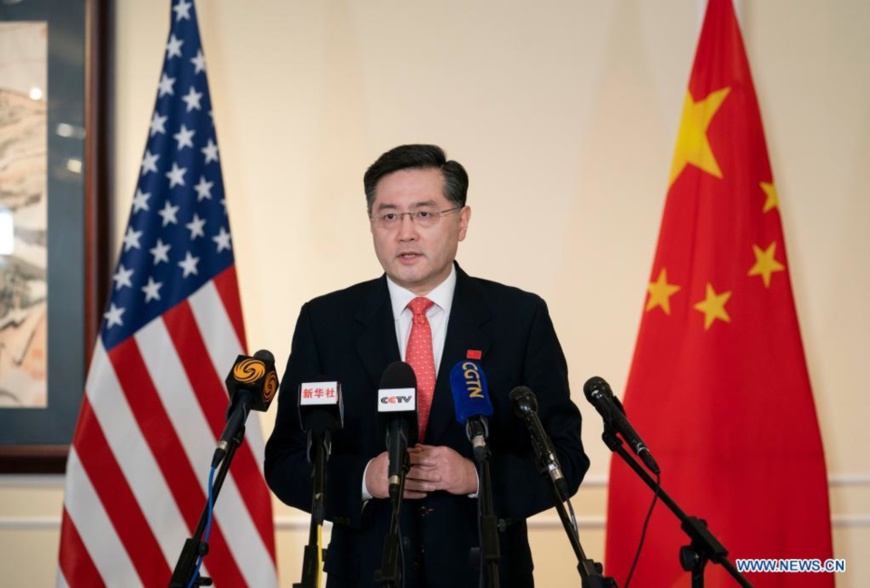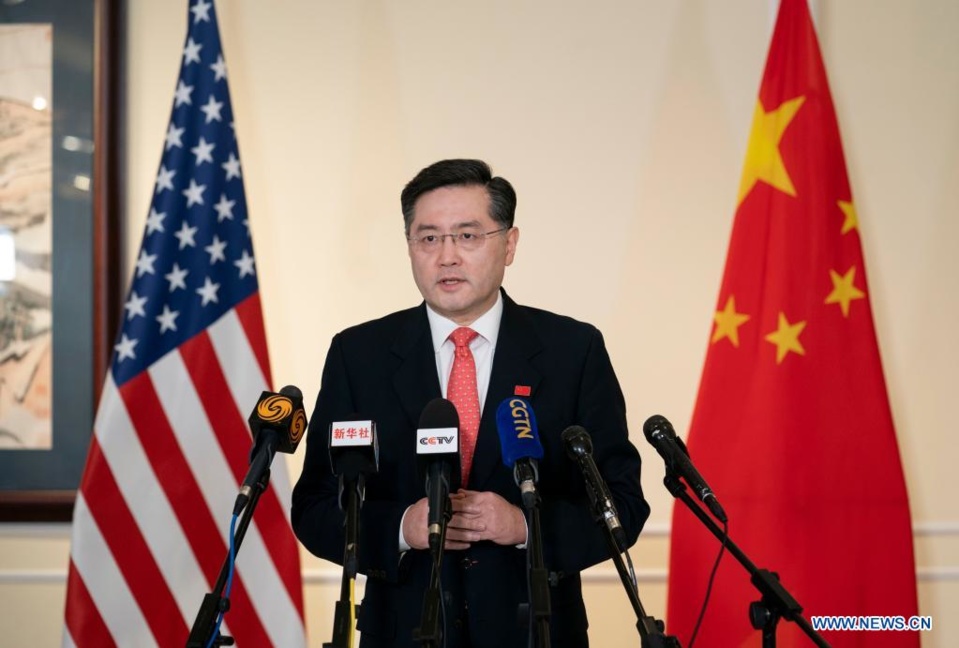By Zhong Sheng, People's Daily

China's new Ambassador to the United States Qin Gang makes remarks to Chinese and U.S. media upon arrival in the United States on July 28, 2021. (Xinhua/Liu Jie)
Chinese President Xi Jinping held a phone conversation with his US counterpart, Joseph R. Biden on Sept. 10, and the two leaders had candid, in-depth and extensive strategic communication and exchanges on China-US relations and relevant issues of mutual interest.
Xi explained China's principles and stance on and charted the right course for major issues such as how to develop China-US relations and advance the coordination and cooperation between the two countries, demonstrating China's high sense of responsibility to bring the China-US ties back to the right track of stable development as soon as possible.
This marked the first time of direct conversation between the two leaders since they had a phone talk on the eve of the Chinese Lunar New Year in February.
China and the US are respectively the biggest developing country and the biggest developed country. Whether they can handle their relationship well bears on the future of the world, and it is a question of the century to which the two countries must provide a good answer.
Both history and present have proved that China-US cooperation benefits the two countries and the world, while the confrontation between them would bring harms to both of them and the rest of the globe.
The China-US relationship is not a multiple-answer question of whether they should have good relations, but a compulsory question of how, Xi said.
Both Xi and Biden agreed to maintain frequent contact by multiple means and instruct officials at the working level to intensify the work, conduct extensive dialogue and create conditions for the further development of China-US relations.
This is in line with the common aspiration of international society. It is believed that the direct conversation between the Chinese and US leaders is of irreplaceable importance for the two sides to manage their bilateral relations.
For the time being, the China-US ties are encountering serious setbacks and conflicts. Even the fields that have witnessed successful bilateral cooperation are constantly disturbed by disputes and even frictions. What caused the situation is that the US was comprehending China with a wrongful logic, taking China as its major component and even an enemy, and trying to block and stop China's modernization.
Impacted by such mistaken mindset, the US has constantly challenged China's major interests, enhanced its efforts to contain China, and brought confrontation to every aspect of China-US relations. Smearing China in the international arena, the US has created serious risks against global peace and stability. This goes against the fundamental interests of the two peoples and the common interests of the rest of the world, and has triggered wide concerns from international society.
With major changes and a global pandemic unseen in a century, the world is facing increasing global challenges that need to be addressed urgently. These global challenges cannot be dealt with by any single country alone. They can only be tackled with international cooperation.
Whether China and the US can carry out effective cooperation concerns whether the international society is able to walk out of the very period of turbulence. However, it is the overall environment of China-US relations that decides if such cooperation is normal and constructive. The US cannot, deliberately contain China and hurt China's legitimate interests, and on the other hand, wish China to satisfy the needs of the US unconditionally. Such logic has never worked in international exchanges.
The history of China-US exchanges has fully proved that only by respecting each other's core interests and well managing disputes can the two countries find a solid ground for coordination and cooperation on issues of common interests. At present, international society generally hopes that China and the US can keep their dialogue and enhance coordination on major international and regional issues, including climate change, pandemic control and economic recovery.
The US expressed its willingness to launch more dialogues and cooperation with China in its recent communication with the latter. Since it is somewhat aware of the practical importance of China-US cooperation, it should make concrete changes and create favorable conditions for bilateral cooperation as soon as possible.
Since China and the US established diplomatic ties in 1971, their cooperation has brought tangible benefits to the rest of the world. China and the US need to show broad vision and shoulder great responsibilities. The two countries should look ahead and press forward, demonstrate strategic courage and political resolve, and bring China-US relations back to the right track of stable development as soon as possible for the good of the people in both countries and around the world.
To undo a knot, no one is more suited than the person who tied it. The US should right its wrongs regarding its policy on China, meet China halfway, and develop its relations with China on the basis of mutual respect and treating each other as equals.
(Zhong Sheng is a pen name often used by People's Daily to express its views on foreign policy and international affairs.)
Xi explained China's principles and stance on and charted the right course for major issues such as how to develop China-US relations and advance the coordination and cooperation between the two countries, demonstrating China's high sense of responsibility to bring the China-US ties back to the right track of stable development as soon as possible.
This marked the first time of direct conversation between the two leaders since they had a phone talk on the eve of the Chinese Lunar New Year in February.
China and the US are respectively the biggest developing country and the biggest developed country. Whether they can handle their relationship well bears on the future of the world, and it is a question of the century to which the two countries must provide a good answer.
Both history and present have proved that China-US cooperation benefits the two countries and the world, while the confrontation between them would bring harms to both of them and the rest of the globe.
The China-US relationship is not a multiple-answer question of whether they should have good relations, but a compulsory question of how, Xi said.
Both Xi and Biden agreed to maintain frequent contact by multiple means and instruct officials at the working level to intensify the work, conduct extensive dialogue and create conditions for the further development of China-US relations.
This is in line with the common aspiration of international society. It is believed that the direct conversation between the Chinese and US leaders is of irreplaceable importance for the two sides to manage their bilateral relations.
For the time being, the China-US ties are encountering serious setbacks and conflicts. Even the fields that have witnessed successful bilateral cooperation are constantly disturbed by disputes and even frictions. What caused the situation is that the US was comprehending China with a wrongful logic, taking China as its major component and even an enemy, and trying to block and stop China's modernization.
Impacted by such mistaken mindset, the US has constantly challenged China's major interests, enhanced its efforts to contain China, and brought confrontation to every aspect of China-US relations. Smearing China in the international arena, the US has created serious risks against global peace and stability. This goes against the fundamental interests of the two peoples and the common interests of the rest of the world, and has triggered wide concerns from international society.
With major changes and a global pandemic unseen in a century, the world is facing increasing global challenges that need to be addressed urgently. These global challenges cannot be dealt with by any single country alone. They can only be tackled with international cooperation.
Whether China and the US can carry out effective cooperation concerns whether the international society is able to walk out of the very period of turbulence. However, it is the overall environment of China-US relations that decides if such cooperation is normal and constructive. The US cannot, deliberately contain China and hurt China's legitimate interests, and on the other hand, wish China to satisfy the needs of the US unconditionally. Such logic has never worked in international exchanges.
The history of China-US exchanges has fully proved that only by respecting each other's core interests and well managing disputes can the two countries find a solid ground for coordination and cooperation on issues of common interests. At present, international society generally hopes that China and the US can keep their dialogue and enhance coordination on major international and regional issues, including climate change, pandemic control and economic recovery.
The US expressed its willingness to launch more dialogues and cooperation with China in its recent communication with the latter. Since it is somewhat aware of the practical importance of China-US cooperation, it should make concrete changes and create favorable conditions for bilateral cooperation as soon as possible.
Since China and the US established diplomatic ties in 1971, their cooperation has brought tangible benefits to the rest of the world. China and the US need to show broad vision and shoulder great responsibilities. The two countries should look ahead and press forward, demonstrate strategic courage and political resolve, and bring China-US relations back to the right track of stable development as soon as possible for the good of the people in both countries and around the world.
To undo a knot, no one is more suited than the person who tied it. The US should right its wrongs regarding its policy on China, meet China halfway, and develop its relations with China on the basis of mutual respect and treating each other as equals.
(Zhong Sheng is a pen name often used by People's Daily to express its views on foreign policy and international affairs.)
 Menu
Menu
 China, US must answer the "question of the century" with strategic courage, political resolve
China, US must answer the "question of the century" with strategic courage, political resolve
















